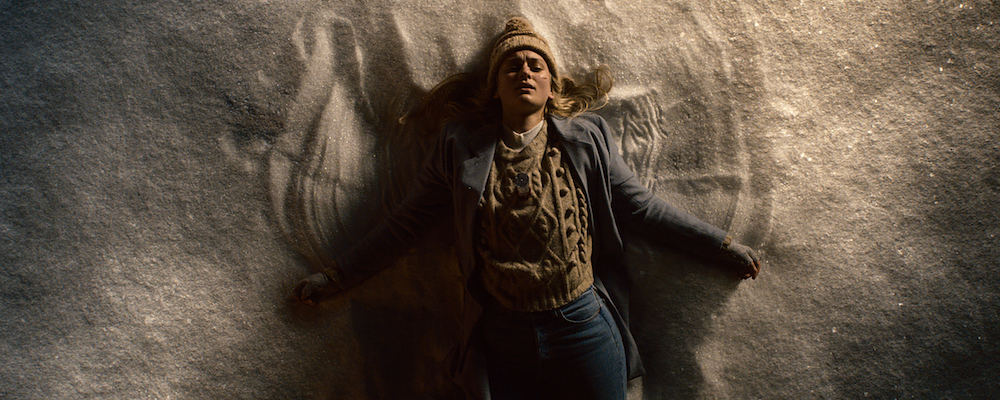‘Black Christmas’ Takes on the Patriarchy With Gloomy Goofiness
Alci Rengifo
When Friday the 13th falls in December Blumhouse Productions feels obligated to deliver a new slasher movie. Not only that, but one that also contains a serious social message at its blood-soaked core. “Black Christmas” loosely updates a 1974 Canadian cult film of the same name. Loosely is almost putting it lightly however. This one becomes all about college campus buzzwords concerning gender and frat culture, but spun into a wild supernatural premise that you need to see to believe. Yet instead of being a 70’s-style romp, this new version moves along with more gloom than fun.
It’s winter break at the very Ivy League Hawthorne College. Riley Stone (Imogen Poots), nice and sincere, is trying to put a sexual assault behind her involving a campus big shot. Her sisters at Mu Kappa Epsilon, Marty (Lily Donoghue), Kris (Aleyse Shannon) and Jessie (Brittany O’Grady) have her back and push Riley into joining them for some Christmas festivities, one which includes a dance number slamming frat rape culture. Kris is also running a petition against an English professor, Gelson (Cary Elwes), who scoffs at complaints about a lack of women authors in his syllabus. But when several women start disappearing, attacked at night by a masked killer in some kind of dark cloak, Riley and her friends begin to suspect something terrible is encroaching on them. Strange texts issue grim warnings on their phones and it seems as if no man can be trusted. As they try to find the killer’s identity, they also uncover an underground cult devoted to a demonic worship of masculinity centered around the college’s founder.
Blumhouse hasn’t functioned as a nostalgia factory so much as an update on the B movie style. When it works we get memorable popcorn entertainment like “Upgrade” or “Happy Death Day,” when it’s great the result is a film like Jordan Peele’s “Get Out.” But “Black Christmas” is curiously detached from its own genre. Aside from a fittingly over the top murder involving an icicle at the beginning, most of the first and second acts lumber along, draped in depressed greys with characters written like grindhouse heroines but trapped in a low-energy production. It’s almost as if director Sophia Takal’s talents would be better suited for an actual serious drama. There are some good shots in this movie that wink at the low-budget slasher film tradition, like eerie close-ups of gargoyle-like sculptures around campus, intercut with shots of Riley somberly walking to her dorm. But the rest feels like a half-baked attempt at trying to be both a goofy entertainment and a message movie.
It’s not as if the themes of women’s empowerment or sexual assault on campus are not valid, they most certainly are. But “Black Christmas” tries too hard on the buzzwords and not hard enough on being engaging. The bad guys are essentially white frat bros who are angry at Riley for daring to accuse one of their own, and Professor Gelson, who likes to demonstrate in class how you can’t tell if something was written by a man or woman. Essentially they symbolize white privilege, which Kris targets with a vengeance by successfully petitioning to have the college founder’s bust removed. Our heroines even stage a performance in Santa hats where they rewrite “Up on the House-Top” as a rather convincing anti-rape song, the frat guys of course are not too happy about it. It’s likely the film’s best scene.
This set-up is fine, but what follows simply doesn’t do much. Most of the film is stuck inside dorm rooms as Riley, Kris, Marty and Jessie argue about the texts and Kris’s provocative activism. At one point Marty’s boyfriend Nate (Simon Mead) can’t take it anymore and throws a fit over the girls’ man-hating. In-between all this there are a few murders, shot so boringly they seem to just happen. Of course a film shouldn’t be grotesque for the sheer sake of it, but grindhouse movies have a particular energy to them this title lacks. Just look at how “Happy Death Day” combines collegial commentary with unabashed humor and ridiculous violence, or even Ryan Murphy’s recent “American Horror Story: 1984” on television.
When “Black Christmas” gets more engaging is curiously enough when it goes off the rails into a plot involving the frat bros belonging to an underground cult, in which the campus founder’s spirit is absorbed to “bring out the real alpha” out of initiates. What began as a slasher movie turns into a Satanic silly fest where toxic masculinity is symbolized by white guys literally chanting with wooden paddles in cloaks. They try to get a woman to bow to their order and scoff, “your body, your choice.” At this point the movie has taken its point to a ridiculous extreme. In the 1974 original everything the women face turns out to be based on a very human threat, and thus more disturbing. We don’t need dark forces to confirm that toxic masculinity is bad. A guy wielding a knife, or in this case a bow and arrow (yes, indeed) is enough of a villain without the aid of dark spirits hiding as bubbling ooze beneath a white patriarch’s bust.
So what we have with “Black Christmas” is a first half that drags and a third act that goes insane to an eyebrow-raising degree. It could have been even more subversive, but lacks the spirit of a movie like the recent “Ready or Not,” where a wealthy family decides to hunt its latest in-law. This one barely tries and when it finally decides to go for broke it goes so over the top it provokes more chortles than jumps. It has the right message, but not the right delivery.
“Black Christmas” opens Dec. 13 in theaters nationwide.

